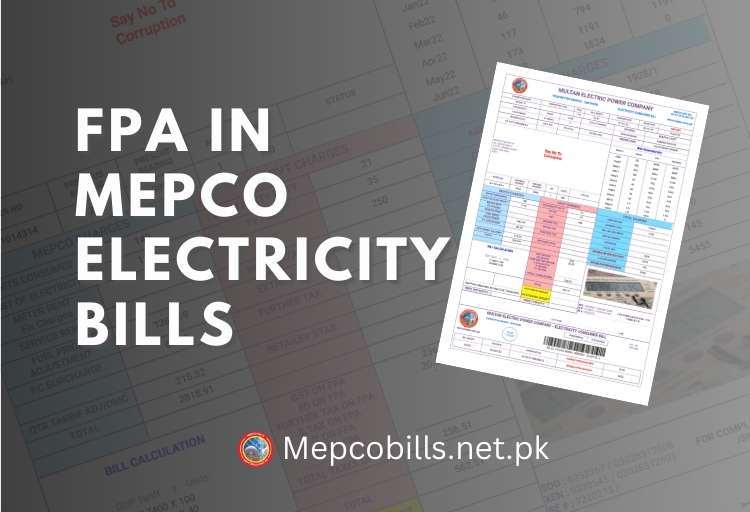What is FPA in Mepco Electricity Bills
MEPCO (Multan Electric Power Company) plays a vital role in providing electricity to its customers. If you are a customer of MEPCO, you might have noticed the term “FPA” on your electricity bill.
In this article, we will delve into the meaning of FPA, its calculation, and how it affects your total MEPCO bill. By the end, you will have a clear understanding of this important component of your monthly statement.

What does FPA stand for?
FPA, in the context of MEPCO electricity bills, stands for Fuel Price Adjustment. It is an additional charge included in your bill to account for the fluctuations in the cost of fuel used to generate electricity.
The purpose of FPA is to shield consumers from sudden changes in electricity prices caused by variations in fuel costs.
How Is FPA Calculated?
The calculation of FPA involves several steps. The Fuel Information Price List (FIPL) published by the National Transmission and Dispatch Company (NTDC) serves as a reference for determining the FPA.
This list provides information about the prices of different fuels used in power generation plants, such as HSD, LDO, and Furnace Oil.
To calculate the FPA, the fuel charges of all power generation plants are added together, and a weighted average price per unit of fuel consumed is obtained.
This weighted average, along with other operating charges like vegetation management, urea injection for NOx reduction, and maintenance expenses, is referred to as Elementary Fuel Charges (EFC) per unit.
To recover these costs from customers, a surcharge known as the Fuel Price Adjustment (FPA) is levied.
The FPA is listed as a separate line item on your monthly bill, alongside other charges such as energy charges, monthly minimum charges, and adjusted energy surcharge.
Factors Influencing FPA in Electricity Bills:
Several factors contribute to the variation in FPA charges on your electricity bill:
- Fuel prices: The prices of fuels like natural gas, oil, and coal play a significant role in determining the FPA. As the cost of these fuels fluctuates, the FPA charges may increase or decrease accordingly.
- Dollar rate: For a country like Pakistan that relies on imported fuels, changes in the dollar rate can impact the cost of purchasing fuel. These fluctuations can influence the FPA charges on electricity bills.
- Economic conditions: The overall economic stability of a country indirectly affects FPA prices. When a nation depends on imported fuels, economic factors can contribute to changes in fuel prices and subsequently impact FPA charges.
Calculating FPA in the Electricity Bill
To calculate the FPA charges, you need to know the current FPA rate, which can vary each month. Multiply the FPA rate by your total electricity consumption during the billing period. The resulting amount represents the FPA charges for that specific period.
It is essential to note that FPA rates can change from month to month. Therefore, it is crucial to carefully review your electricity bill each month to check for any changes in the FPA rate.
Conclusion
Fuel Price Adjustment (FPA) is a component of MEPCO electricity bills that reflects the changes in the cost of fuel used for power generation. It serves as a means to protect consumers from sudden fluctuations in electricity prices caused by fuel price variations.
The calculation of FPA involves considering the Fuel Information Price List (FIPL) published by the NTDC and determining the weighted average price per unit of fuel consumed.
Factors such as fuel prices, dollar rate fluctuations, and economic conditions influence the FPA charges on your electricity bill. By understanding how FPA is calculated and being aware of the factors that impact it, you can gain a clearer understanding of your monthly electricity costs.
MEPCO, as a responsible power distribution company, strives to provide transparent and fair billing practices. Regularly reviewing your electricity bill and keeping track of any changes in the FPA rate will enable you to stay informed and manage your energy consumption effectively.
